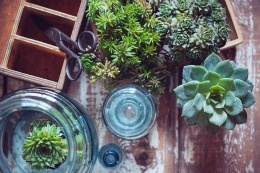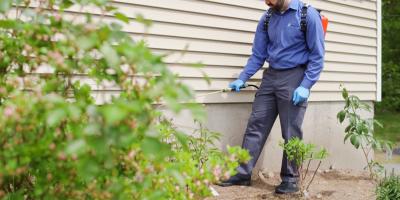Controlling Houseplant Pests

Sometimes, no matter how well you care for your green, leafy friends, you just can’t keep them healthy. Seeing our houseplants unhappy is especially frustrating when you know you’ve done everything you can to care for them but they’re just not growing right. In certain cases, however, your plant’s ill health can be attributed to third party interference -- bugs. Take a look at the following easy tips for getting rid of common houseplant pests.
Spider Mites
Mites are not technically insects, but are more closely related to spiders (which are arachnids). They are remarkably tiny and therefore difficult to spot, so plant damage is usually the first sign that will alert you to their presence. Spider mites suck the sap from leaves and stems, which causes damage to your plants. The damage can present itself as a faded mottle on either side of leaves, or in more severe instances, a sickly yellow-bronze that can result in the plant’s death. Spider mites are typically a larger threat to houseplants than outdoor garden plants.
To control spider mites, simply spray stronger plants forcefully with water, making sure to include the bottom of each leaf. A vigorous dousing with water will dislodge mites and destroy their webs. Certain plants can also be treated with insecticidal soap. It may be necessary to repeat this process for a few consecutive weeks to be thorough. Plants that are relocated outdoors during summer months might not experience problems with spider mites.
Aphids
Aphids are tiny insects from the family Aphididae that usually measure less than one eighth of an inch in length. They typically appear light green in color, but can also be pink, white, grey, or black, depending on the specific species. Adult aphids usually have a shape similar to that of a pear. Winged aphids will appear after aphid communities have become well established, and they will fly to find other plants to colonize. Young aphid nymphs look like smaller adult aphids.
Healthy plants are far less susceptible to aphid attacks than weakened and stressed plants. As with spider mites, aphids can be washed away with a strong stream of water. Neem oil can also be used to repel insects such as aphids, and as an added bonus, includes fungicidal properties. The EPA endorses neem oil as safe to use on ornamentals as well as vegetables and edible plants.
Fungus Gnats
Fungus gnats are tiny black insects that thrive in the nutrient-rich soil of potted houseplants. Their larvae can damage the roots of plants, which can eventually kill them. Fungus gnats can be seen running or flying near the soil surface of a house plant. They are weak fliers, and are attracted to light sources.
For houseplants that can withstand some dehydration, allow the soil to dry between watering. Do not let water stand in the saucer underneath potted plants. Some experts recommend filling a large bowl halfway with apple cider vinegar to attract the fungus gnats away. Adding five drops of liquid dish soap will trap the gnats in the mixture as they explore for food.
Is your houseplant pest problem out of your control? The experienced professionals at JP Pest Services can get rid of whatever might be bugging your plants quickly and completely! Contact JP Pest Services to request a free residential estimate today!



